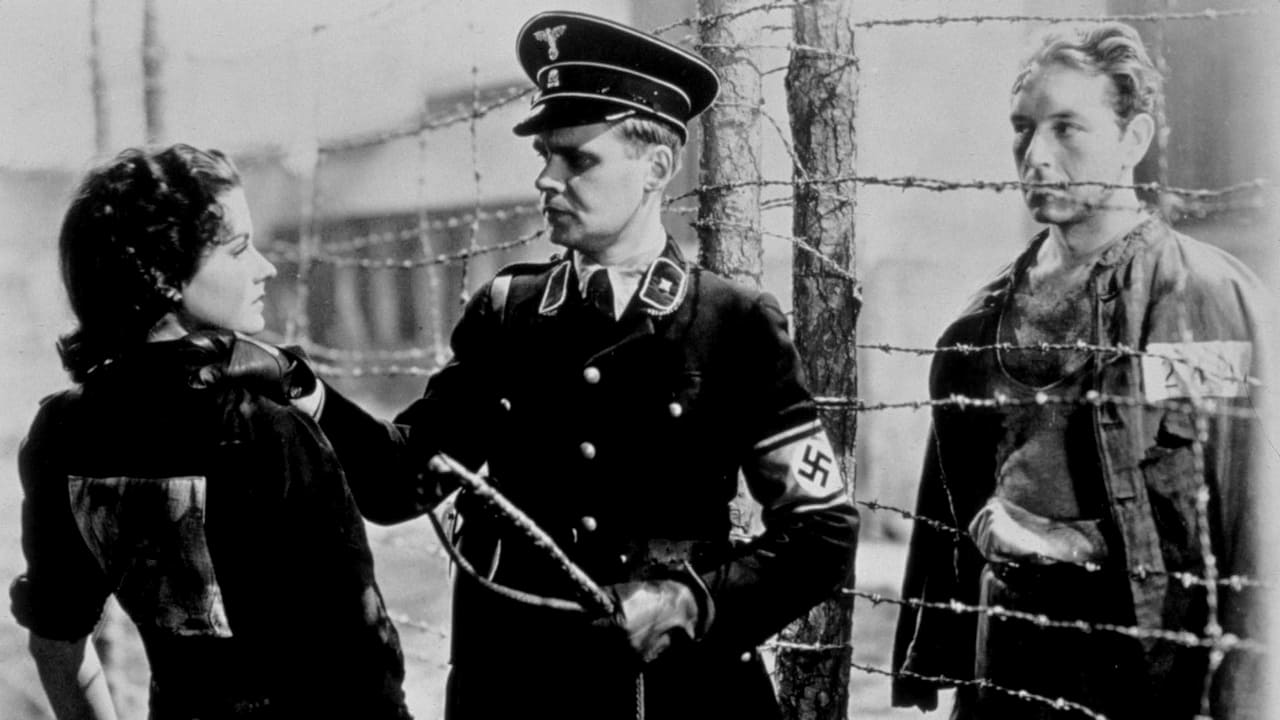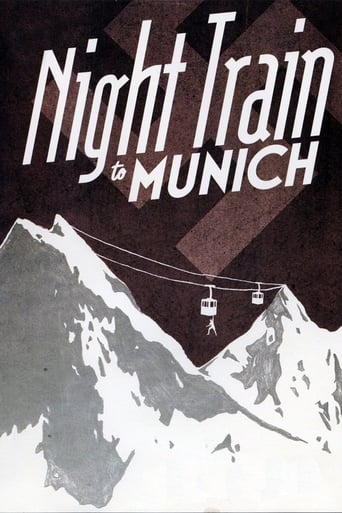


Producer: Edward Black. Made at Gaumont British Studios, Shepherd's Bush. In charge of production: Maurice Ostrer. A 20th Century production. Not copyrighted in the U.S.A. New York opening at the Globe: 29 December 1940. U.S. release through 20th Century-Fox: 18 October 1940. U.K. release through General Film Distributors: 31 August 1940. London opening at the Empire, Leicester Square: 25 July 1940. Australian release through Metro-Goldwyn-Mayer: 30 January 1941. 8,535 feet. 95 minutes. U.S. release title: NIGHT TRAIN. SYNOPSIS: A British spy rescues a Czech scientist and his beautiful daughter from the Nazis. NOTES: Gordon Wellesley was nominated for an Academy Award for his Original Story, losing to Here Comes Mr Jordan. One of Australia's top forty-five box-office attractions for 1941, the movie also took good money in England and - to 20th Century-Fox's immense surprise - in the U.S.A. COMMENT: Even if the direction is more routine than imaginative, it's odd to find Carol Reed mixed up in this rather juvenile spy story. True, on its own comic-paper level, it is rather jolly in its adventuresome, Boy's Own Paper way. Rex Harrison enjoys himself with no less than two impersonations: a seaside ballad singer and a be-monocled German major. Margaret Lockwood, as usual, makes a reasonably vivacious heroine. Plus there's nice character work by folk like Raymond Huntley (in a black wig), C.V. France (a Nazi admiral), while Wayne and Radford reprise their Englishmen-abroad routine from The Lady Vanishes. Looking surprising young, youthful and clean-cut (which makes a rather agreeable change) as the villain, Paul Henreid lends admirable color. Production values are high, despite lots of miniature work (realistic enough to fool most picturegoers in 1940, though to-day's more sophisticated fans will probably not be deceived). Whatever else, Night Train to Munich is superbly photographed. Many of the sets are likewise impressive. OTHER VIEWS: This honey of a thriller is one of the outstanding prototypes of the screen spy genre. - Parish & Pitts: The Great Spy Pictures.One of the top ten spy movies ever made. - Nash & Ross: The Motion Picture Guide.
... View MoreDuring WWII, Nazis chase a scientist who could help their cause from Prague to London to Berlin to Munich. Well-made spy adventure borrows not only the premise of an eventful train ride but also three actors from Hitchcock's "The Lady Vanishes." Lockwood and Harrison work well together, engaging in some witty banter. Radford and Wayne provide the comic relief in reprising their roles from the Hitchcock film. Henreid is solid as a Nazi officer. The ease with which Harrison infiltrates the Nazis, posing as one of their officers, is too simplistic and far-fetched to be believable. The final shootout is also less than convincing in this implausible but entertaining film.
... View MoreJust as Germany invades the Sudatenland, Czech engineer Axel Bomasch fearing he may have to work for the Nazi cause, flees to England, being separated from his daughter Anna (Margaret Lockwood) on the way. Anna is imprisoned in a concentration camp where she befriends Czech nationalist Karl Marsen (Paul Henreid), he helps her make her escape and flees with her to England where they meet up with her father. Almost immediately they are hoodwinked by German agents posing as British naval officers and are brought back to Germany where Bomasch's knowledge on armour plating will be used for the imminent war. A fearless Gus Bennett (Rex Harrison) endeavours to travel to Germany in disguise to recapture the Domasch's in a daring raid.After the success of Alfred Hitchcock's The Lady Vanishes(1938), screenplay writers Sidney Gilliat and Frank Launder returned to very similar ground with Night Train to Munich, again we have Nazi's and spies in pre-war Germany, again we are on a perilous train journey and again Margaret Lockwood is the lead and we also have Naunton Wayne as Caldicott, Basil Radford as Charters reprising their roles as the amiable Cricket loving buffoons. Its not quite as polished as Hitch's film and it is a little heavy on the propaganda, Germans being dour martyrs to the cause, all the Brits being, chirpy "Mornin Govnor" types, but there's still plenty to enjoy, Rex Harrison's cocky Gus Bennett, in a series of disguises and treating us to some seaside numbers, Naunton and Wayne are comedic top form, the train scenes also have plenty of tension as we race to a heart stopping climax on a cable car.
... View MoreThe French are ardently patriotic; the Germans swell with tender pride; the Americans get earnest and emotional; but surely only the English can ever have acquired the idiosyncratic habit of making propaganda by raising a laugh at our own expense? It's a trait that, I suspect, may well leave other nations mystified; but it is this sting of self-deprecating irony that leavens the best of British war films and is characteristic of its era. Coincidentally, it also helps to make them notable long after the event, where more conventional propaganda tends to become ponderous and slightly embarrassing. Englishmen of a certain class have always made a virtue of never taking anything quite seriously -- and so, in lieu of John-Wayne-style heroics, we have Leslie Howard or Rex Harrison serving King and Country under the mask of the charming, seemingly-incompetent amateur.In Night Train to Munich, Charters and Caldicott illustrate perhaps the epitome of English humour at its own expense -- as caricatures they could almost have stepped out of propaganda for the other side. We are intended to laugh at them, and we do. But they represent also all the dogged and prized eccentricity of the nation, a red rag in the face of Nazi efficiency and uniformity. They are insular and sport-obsessed, far more interested in their own affairs than in interfering with the rest of the world: but by jingo, if they do--! As a comedy-thriller "Night Train to Munich" went down very well at the National Film Theatre, and I was very glad to have caught the final screening of the season after missing them all when it played here last year. I did feel that the comedy elements were ultimately more successful than the pure action sequences, though. Given the constraints of wartime filming it suffers understandably from an absence of location shooting and some rather obvious model-work, and the big battle at the finale is riddled with unintentionally comic clichés, such as the revolver that fires dozens of shots without reloading only to come up suddenly empty for dramatic convenience, the enemies who couldn't hit the proverbial barn-door with a rifle while the hero is unfailingly accurate with a hand-gun, and a crippling wound that is conveniently forgotten when it comes to mid-air acrobatics. The beginning of the film also features one of the most bizarre episodes of would-be brutality that I've ever encountered -- presumably censored for audience sensibilities -- where a concentration camp inmate is apparently being savagely beaten by a guard, but the sound effects attached suggest something more along the lines of a petulant tapping with a fly-whisk! Watching Rex Harrison infiltrate Nazi Germany armed with nothing more than supreme impudence and a monocle, on the other hand, is pure unalloyed delight, as are his undercover scenes in England as he endeavours to hawk popular songs by means of persistent performance. His double-act with Margaret Lockwood as they portray the warring couple who inevitably end up united is both amusing and genuinely credible: the film admirably refrains from underlining the moment when she -- and the audience -- realise that she really does care for him. And, as always with actors originally recognised from performances in middle age, he comes across as amazingly young and debonair, and yet still unmistakably Rex Harrison -- a slightly disorienting experience! The real disorientation, however, comes from the casting of Paul Henreid in the rival role of Karl Marsen, the Nazi intelligence agent, a coup that becomes quite unintendedly effective from his subsequent Hollywood career featuring parts as romantic leads. Given that I'd last seen him as sensitive confidant of Bette Davis in "Now, Voyager", I instinctively assumed that his clean-cut Czech resister was to be the hero of the piece, and the role reversal took me as completely by surprise as could have been hoped for. But the character remains an oddly sympathetic one -- indeed, the Germans in general are depicted as harassed human beings rather than monsters -- and it is hard not to empathize with him as he watches his 'womanising' rival supposedly sweep the girl they both love off her feet. In the final scenes, as he lies wounded in the path of the returning cable car, I found myself frankly terrified on his behalf that the action clichés would culminate in Karl's death crushed beneath the cabin that has carried his rival to safety, and surprised and relieved when he was allowed -- albeit bereft -- to survive the battle."Night Train to Munich" is probably most effective when it is at its most flippant, whether at the English or German expense, and at its most formulaic where it tries to be 'serious'. But it has moments of genuine tension and feeling and is a fast-moving, entertaining picture. It's a long time since I saw "The Lady Vanishes" -- of which this is often cited as a pale shadow -- and the Hitchcock production doesn't seem to have left much impression on me over the intervening years; but I thoroughly enjoyed "Night Train to Munich", for all its flaws, and remain impressed by its sheer sangfroid as a wartime morale-raiser.
... View More